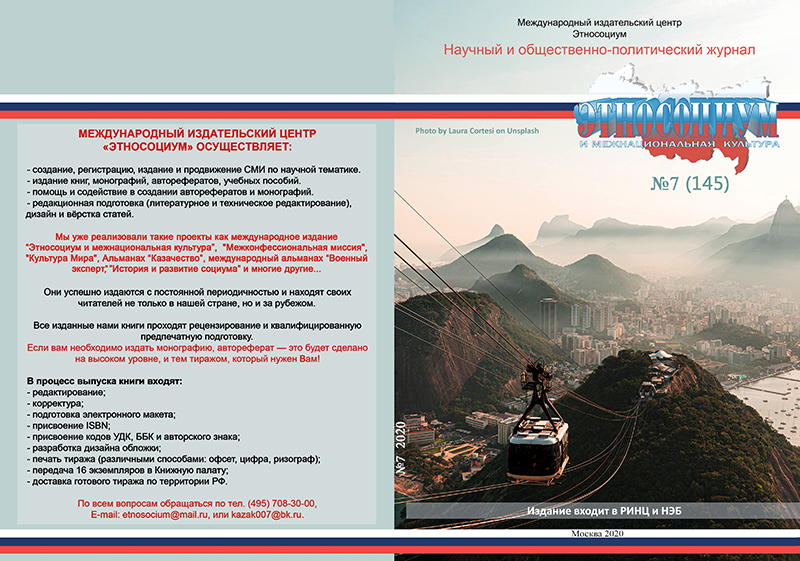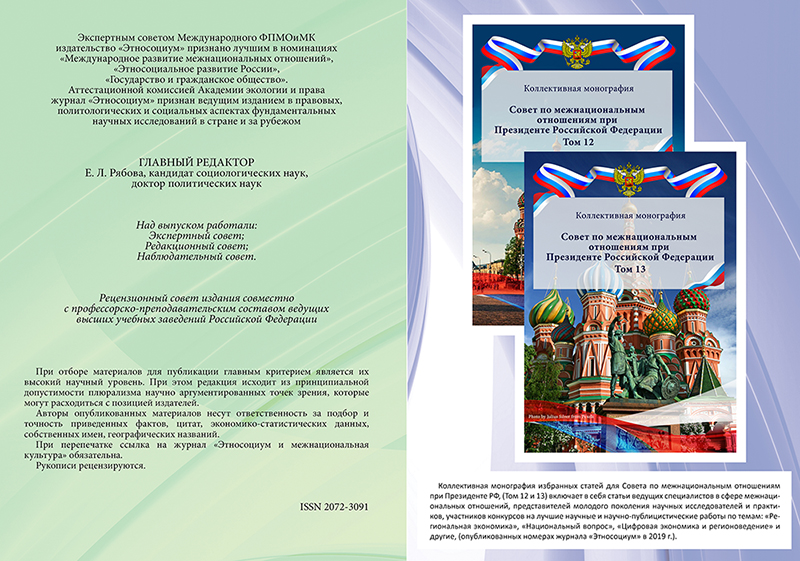

Content
|
COUNCIL OF INTERNATIONAL RELATIONSHIP
|
|
|
Bormotova T.M. Migration processes in the border regions of Russia: status and peculiarities
|
9
|
|
Zolotarev N.A., Matveenko Y.I. Instruments of the Russian state policy on managing modern political risks
|
18
|
|
Zemtsov B.N., Suzdaleva T.R. Prevention of extremist sentiments in the student environment
|
25
|
|
ACTUAL PROBLEMS OF MODERN SOCIETY
|
|
|
Mikhailova A.V. Religious associations and the Russian State: stages of the establishment of new relations in modern Russia and their impact on national security
|
37
|
|
Volgin G.S. Opportunities and potential of the symbolic measurements for analysis of the public policy
|
46
|
|
REGIONAL STUDY
|
|
|
Belugina N.B. Features of political discourse formation in social media in modern conditions
|
52
|
|
Yatsulyak V.V. Influence of civil society on the Russian social security system
|
58
|
|
INTERNATIONAL RELATIONSHIPS
|
|
|
Miao Hui, Zhang Yangyang Environmental idea of Nikolay Baikov
|
67
|
|
Kudashova N.N. The position and political role of Germany in the modern world
|
74
|
|
Nagotnyh O.V. The politics of memory in the process of decommunization in Poland
|
86
|
|
Abstracts
|
98
|
|
Authors
|
107
|
|
Requirements to materials submitted to the international publishing house "Etnosocium"
|
109
|
The article deals with the problematic issues of the current migration situation in the border territories of the Russian Federation, which has an ambiguous impact on the socio-economic and political situation in Russia. The impact of migration is considered one of the most important aspects of national security. Therefore, Russia's migration policy in terms of regulating migration processes should be built in accordance with the national interests of the state.
Keywords: population migration, migration security, migration policy, border regions.
The article explores the concept and essence of political risks, analyzes the instruments of the Russian state policy for managing them. The author pays significant attention to the study of the political risk insurance system in Russia and abroad, analyzes some similarities and differences in the activities of insurance companies. The article proposes to develop the activities of private providers in the political risk insurance system in the country, as it will help to strengthen public-private partnerships in this area, which have shown high efficiency in many countries all around the world.
Keywords: political risk, management mechanism, state policy, insurance, export credit agency, Russia, export support.
The article summarizes the recent experience of universities in preventing extremism among students. The authors assume that extremist attitudes in this social segment have the same reasons as among young people in General. But the scale, forms of manifestation, and, consequently, the direction of preventive work are somewhat different.
The authors believe that due to the internetization of society, there is a need to optimize the counteraction to extremist moods in the network space. It focuses on such formats as video games, comics, Internet memes, and so on.
The higher school, which has a high scientific and cultural potential, has significant opportunities to prevent the spread of extremism. Humanities departments can play an important role, especially in non-humanitarian universities. The article reveals the experience of their work. However, there are a number of factors that reduce the effectiveness of their activities in this direction.
Keywords: extremism, student youth, educational work, Humanities.
Political processes involving the relations between the State and the confessions that took place in our country at the end of the XX – beginning of the XXI century resulted not only in positive changes in political and social structure of modern Russia, but also transformed in a favorable way the relations between religious associations and the Russian State. Consequently, it helped to remove official prohibitions on the activities of religious associations in the mail social spheres: youth policy, education and formation, culture and charity as well as legislative sphere. After analyzing the results of the latter, the author gives a brief description of the implementation of legislation on freedom of conscience, freedom of religion and religious associations in modern Russia as well as its impact on national security.
Keywords: national security, political order, religious association, relations between State and confessions, freedom of conscience, freedom of confession, ideological diversity, Soviet model, anti-religious policy, Russian State.
The article discusses symbolic dimensions used in the analysis of public policy. The goal is to determine their capabilities and potential in modern political realities. Work execution using general scientific methods of analysis, synthesis and comparison. Its main results are the definition of symbolic means as public policy resources used to legitimize the order of things established in a certain community. One of the most important dimensions in the framework of symbolic politics is memory, which acts as a certain set of structures in the sphere of communication, which projects social expectations on current reality. The components of such a dimension of symbolic politics as memory are two components of political identity: myths and rituals. The myth itself is a key link in the process of forming political identity as such. It gives members of the identified community a specific role, which in reality is only a symbol. The ritual becomes a derivative of the myth. In fact, any symbolic action for consciously or unconsciously designating one's own identity is already a certain ritual. From a historical point of view, the problems of the implementation of symbolic politics were inextricably linked with cult and religious customs, which, in essence, became the basis for the functioning of a society divided into identified groups. Today, modern society is guided to a greater extent by aspects of public policy, since religious issues have faded into the background. Accordingly, the characters are also changing - the issue of entertainment, openness, accessibility acquires a key role. The process of creating and transforming political and social traditions on the issue of political identity ultimately leads to a close relationship between the past and the present, despite the high degree of mediocrity and conditionality of this connection from the point of view of scientific discourse, which makes their study significant for modern public policy.
Keywords: public policy, symbols, memory, myths, rituals, customs.
The article is devoted to the peculiarities of political discourse formation in social media. The author highlights the features of social media as an environment for the formation of political discourse in modern conditions. The article examines such characteristics of social media as audience fragmentation, interdiscursiveness, horizontal nature of communication and multimodality.
Keywords: social media, political communication, political discourse, communicative practice, symbolic politics.
Many studies have argued that depoliticized non-profit organizations (NPOs) in Russia, as an institution of civil society will lead to democratic changes through gradual actions. However, the country has recently witnessed a reduction in the political and legal space for public participation, especially for foreign-funded civil society organizations, all of which play a significant role in the functioning of the social security system. This article analyzes the impact of civil society on the social security system in Russia under the law on NGOs.
Keywords: civil society, social security system, non-profit organizations in Russia.
The article examines the ecological consciousness of Nikolai Baykov. N. Baikov, who has lived in northeastern China for over 40 years, wrote many ecological literary works describing the nature of northeastern China in a combination of naturalism and realism. He created poetic, mysterious and romantic images of animals in the taiga. He warned us to live in harmony with nature. This is an environmental law. The scientific novelty of the research lies in the analysis of ecological consciousness in the works of N. Baikov, as well as in the study of the relevance of the ecological idea, and in the initiation of a general ecological concept.
Keywords: N. Baykov, Great Van, environmental ideas, harmony, nature and humanity are one, relevance.
The article describes Germany’s present position and role in the system of international relations basing on the theory of middle powers. The role of Germany in terms of resources, behavior and identity is evaluated. The analysis of expert publications allowed to reveal three main topics regarding Germany’s role: leadership in Europe; necessity to strengthen its role is European and global security; the key role in the advancement of multilateralism, cooperation and diplomacy, as well as in maintaining the world’s liberal order.
Keywords: Germany, middle powers theory, international relations.
The article is devoted to the politics of memory in Poland. The author identifies the main mechanisms of memory policy. The politics of memory in the process of decommunization in Poland is one of the controversial issues. Poles remain divided over the communist past. Local communities play an important role in interpreting past events.
Keywords: decommunization, politics of memory, emotion, Poland.